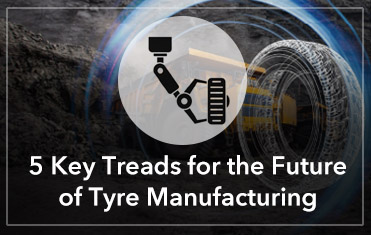The Future of Tyres
The future of transportation is tightly integrated with the evolution of tyres. As the vehicles become smarter, safer and more sustainable, tyres must evolve as well.
The demand for tyres is increasing significantly. It’s not that more of the same vehicles are being manufactured – vehicle types are also becoming more varied and complex, requiring a wide range of customized and technical tyres.
Autonomous vehicles are driving on city streets and highways and working on farms and in mines. Fleets of self-driving, around-the-clock equipment will require creative new tyre management solutions. The trend toward electric vehicles (EV) means major changes for the tyre industry. As EVs are heavier and produce immediate torque, tyres need to be designed differently to optimize their efficiency and performance.
Tyre manufacturers and suppliers need to speed up their design cycle, which covers product design, simulation, physical testing and manufacturing. The technologies brought forth in the 4th Industrial Revolution allows these companies to connect all stakeholders for sustainable collaboration throughout the development process, transforming their production into a flexible and streamlined operation, and improving material management and reducing waste for a more positive environmental impact.
How can tyre manufacturers manage their design cycle while meeting various regulations?
- Dassault Systèmes’ 3DEXPERIENCE solutions help tyre manufacturing companies speed up their design cycle, which covers product design, simulation, physical testing and manufacturing.
- With Dassault Systèmes’ industry solution experiences, they enter the 4th Industrial Revolution by connecting stakeholders for sustainable collaboration throughout their development process, transforming their production into a flexible and streamlined operation, and improving material management and reducing waste for a more positive environmental impact.
- To save energy and to improve mobility and security, tyre companies strive to continuously introduce design innovations and comply with local regulations while reducing raw material usage. Components can vary from one country to another, forcing manufacturers to manage a large portfolio of machine parts to satisfy requirements.
- To remain compliant, manufacturers can better manage their risk and mitigate costs by adopting a risk-based approach to compliance tailored to their unique method of operations, risk profile, countries of operation, and products sold.
For more information, write to us at marketing@edstechnologies.com






